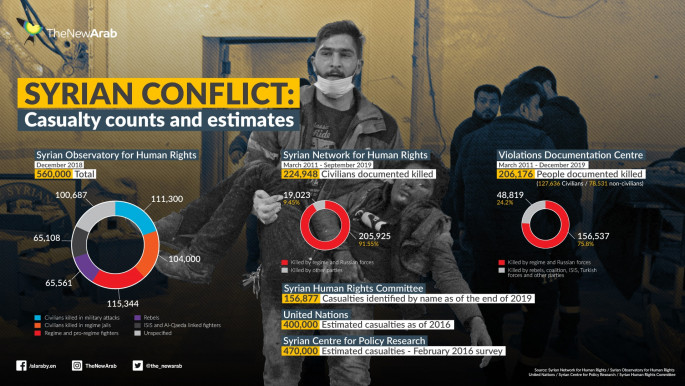Idlib onslaught: Turkey will open its borders to let Syrian refugees flee to Europe
Nearly one million Syrians have fled the escalating violence in Idlib, and Turkey has decided it will open its borders and allow refugees to flee to Europe.
2 min read
There are more than 1 million Syrian refugees who fled Idlib [Getty]
Turkey has decided to open its Idlib border with Syria and allow Syrian refugees free passage into Europe for the next 72 hours in a bid to aid the nearly one million refugees who have fled the Idlib violence alone.
It will no longer stop Syrian refugees from reaching Europe by land and sea, a senior Turkish official told Reuters.
Turkish police, coast guard and border security officials have been ordered to stand down, the Turkish official added.
“Turkey’s refugee policy hasn’t changed, but we will no longer [be] able to hold refugees,” a spokesperson for the Justice and Development party – Turkey’s ruling party – was quick to add.
The decision comes after a security meeting was chaired by Turkish President Recep Tayyip Erdogan after a deadly Syrian regime airstrike killed dozens of Turkish soldiers in Idlib.
Official figures announced by Turkish governor of Hatay currently put deaths at 29, however the Syrian Observatory posits that as many as 34 soldiers died in a single airstrike by regime forces.
These deaths are the largest number of fatalities suffered by Turkish forces since Erdogan deployed thousands of troops to Idlib in support of rebel forces and in an attempt to halt Syrian President Bashar al-Assad’s operation.
Fahrettin Altun, the Turkish president's communication director, said in a written statement that the Turkish government decided in the meeting to retaliate against Assad's forces by land and by air.
"Turkey is currently hitting all known regime targets. What happened in Rwanda and Bosnia cannot be allowed to be repeated in Idlib."
The UN recently revealed that 900,000 people, mostly women and children, have been forced to flee their homes since the start of December due to a Russian-backed regime offensive in northwest Syria.
That figure is 100,000 more than the UN had previously recorded.
"The crisis in northwest Syria has reached a horrifying new level," said Mark Lowcock, the UN head of humanitarian affairs and emergency relief.
He said the displaced were overwhelmingly women and children who are "traumatised and forced to sleep outside in freezing temperatures because camps are full. Mothers burn plastic to keep children warm. Babies and small children are dying because of the cold".
The Idlib region, including parts of neighbouring Aleppo province, is home to some 3 million people, half of whom have already been displaced from other parts of the country.
Syrian dictator Bashar al-Assad lost huge swathes of the country following an armed uprising after the brutal repression of peaceful protesters in 2011.
It will no longer stop Syrian refugees from reaching Europe by land and sea, a senior Turkish official told Reuters.
Turkish police, coast guard and border security officials have been ordered to stand down, the Turkish official added.
“Turkey’s refugee policy hasn’t changed, but we will no longer [be] able to hold refugees,” a spokesperson for the Justice and Development party – Turkey’s ruling party – was quick to add.
The decision comes after a security meeting was chaired by Turkish President Recep Tayyip Erdogan after a deadly Syrian regime airstrike killed dozens of Turkish soldiers in Idlib.
Official figures announced by Turkish governor of Hatay currently put deaths at 29, however the Syrian Observatory posits that as many as 34 soldiers died in a single airstrike by regime forces.
These deaths are the largest number of fatalities suffered by Turkish forces since Erdogan deployed thousands of troops to Idlib in support of rebel forces and in an attempt to halt Syrian President Bashar al-Assad’s operation.
Fahrettin Altun, the Turkish president's communication director, said in a written statement that the Turkish government decided in the meeting to retaliate against Assad's forces by land and by air.
"Turkey is currently hitting all known regime targets. What happened in Rwanda and Bosnia cannot be allowed to be repeated in Idlib."
The UN recently revealed that 900,000 people, mostly women and children, have been forced to flee their homes since the start of December due to a Russian-backed regime offensive in northwest Syria.
 |
That figure is 100,000 more than the UN had previously recorded.
"The crisis in northwest Syria has reached a horrifying new level," said Mark Lowcock, the UN head of humanitarian affairs and emergency relief.
He said the displaced were overwhelmingly women and children who are "traumatised and forced to sleep outside in freezing temperatures because camps are full. Mothers burn plastic to keep children warm. Babies and small children are dying because of the cold".
The Idlib region, including parts of neighbouring Aleppo province, is home to some 3 million people, half of whom have already been displaced from other parts of the country.
Syrian dictator Bashar al-Assad lost huge swathes of the country following an armed uprising after the brutal repression of peaceful protesters in 2011.





 Follow the Middle East's top stories in English at The New Arab on Google News
Follow the Middle East's top stories in English at The New Arab on Google News
![Israeli forces ordered bombed Gaza's Jabalia, ordering residents to leave [Getty]](/sites/default/files/styles/image_330x185/public/2176418030.jpeg?h=a5f2f23a&itok=_YGZaP1z)

